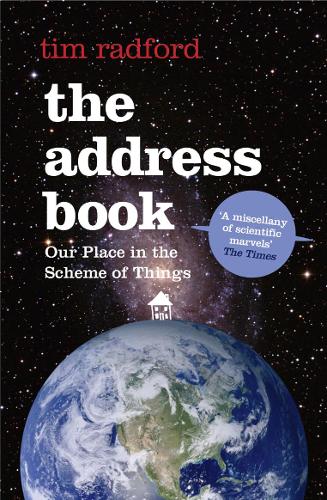
The Address Book: Our Place in the Scheme of Things
(Paperback)
Publishing Details
The Address Book: Our Place in the Scheme of Things
By (Author) Tim Radford
HarperCollins Publishers
Fourth Estate Ltd
2nd July 2012
United Kingdom
Classifications
General
Non Fiction
Geography
500
Physical Properties
Paperback
224
Width 129mm, Height 198mm, Spine 14mm
160g
Description
Over the years, millions of school children must have written out their address in the same way their house number and street, their town, their country, their continent, planet Earth, the universe
Following this simplest of patterns, taking each line of the address as a starting point, Tim Radford explores our place in the scheme of things why we are attached to a particular geographical place and what significance do we have when faced with the realms of astronomy and astrophysics.
Fascinating, entertaining and completely original, The Address Book tackles some of the most fundamental questions facing us, and allows us see ourselves completely afresh.
Reviews
One of our finest science writers Radfords book builds into a complex and compelling linguistic, poetic, scientific, spiritual and historical survey The Times
A beautiful, meditative book showing us that the familiar is stranger than we think, and that the unfamiliar, the cosmos, is even stranger Guardian
Fascinating [a] personal slice of popular science Evening Standard
A miscellany of scientific marvels The Times
This beautiful, meditative book is a surprise in these clamorous times: one good deed in a naughty world Guardian
Author Bio
Tim Radford is a freelance journalist. He was born in New Zealand in 1940 and educated at Sacred Heart College, Auckland. He joined the New Zealand Herald as a reporter at 16, and moved to the United Kingdom in 1961. Apart from a brief spell as a Whitehall information officer, he has spent all his life in weekly, evening or daily newspapers. He worked for The Guardian for 32 years, becoming, among other things, letters editor, arts editor, literary editor and science editor. He won the Association of British Science Writers award for science writer of the year four times. He served on the UK committee for the International Decade for Natural Disaster Reduction. He has lectured about science and the media in Madrid, Santiago, Barcelona, Brussels, Bern, Geneva, Berlin, Bonn, The Hague, Monaco, Stockholm, Ljubljana, Dubrovnik, Auckland, Wellington, Moscow and Krasnoyarsk as well as many British cities. He has written for The Lancet, New Scientist, the London Review of Books and many other journals. He has also written one book, The Crisis of Life On Earth (1990), and edited two books of science writing for the Guardian. He was on the judging panel of the Science (now Aventis) Prize in 1990, and of the Samuel Johnson Prize in 2002. He is married with two children and one grandchild
